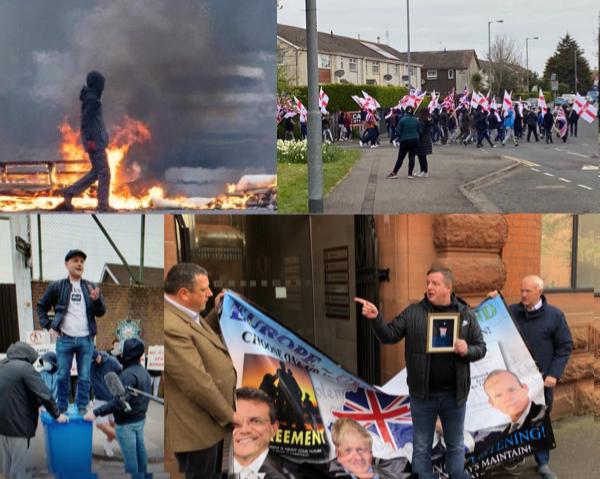
Loyalist street violence dissipated this week as attempts by loyalist leaders to hold peaceful protests also failed to attract significant interest.
There was a brief reapparance last Monday evening (19 April) of the loyalist rioting which had made international headlines.
Furniture was set on fire in the middle of the Shankill Road in west Belfast close to where a bus was set alight earlier in the month. A divan bed and other items were burned as a barricade while the PSNI police came under sporadic attack. However, the trouble was not on the scale of previous clashes.
Several hundred people also took part in four illegal parades in Newtownards and Bangor, with around 100 people estimated to have taken part in each. Following a parade in Newtownards, loyalist commentator Jamie Bryson addressed those attending from the top of a blue bin outside the town’s PSNI station.
The unnotified parades are part of a tactic of using loyalist flute bands to gather protest crowds. Currently anyone wishing to hold a march or parade must notify the Parades Commission in advance.
A small group of loyalists paraded through Markethill on Wednesday evening, and future parades are expected to take place in Moygashel, County Tyrone, and Larne and Ballymena in County Antrim.
And after weeks of relative silence the Loyalist Communities Council (LCC) paramilitary umbrella group eventually staged a two-man demonstration outside Dublin government offices in Belfast city centre.
They unveiled banners featuring political figures from Britain, Ireland and the USA. The anti-Brexit banners, the latest in a series to appear across the north in recent months, say “Ulster is British and this we will always maintain”.
Under London’s Brexit agreement with the EU, a new protocol for the north of Ireland has led to checks on goods coming from Britain into the north’s ports and airports, which have angered unionists and loyalists.
Anger at the protocol has been cited by politicians as a main factor behind the street violence that erupted earlier this month.
However, the attempt by the LLC Chairman David Campbell and colleague David McNarry to draw attention to the issue did not go well. They were confronted by Gareth McCord, whose brother Raymond was beaten to death by a UVF gang, believed to include state agents, in 1997.
The image of Mr McCord holding a picture of his murdered brother as he noted the LCC has no support in loyalist communities dominated the news coverage of the event. Mr McCord mocked the turnout and said it proved that the LCC had no support within loyalist communities. “Nobody wants you, clear off,” he said.
British Prime Minister Boris Johnson said this week his government will try to “sandpaper” rather than scrap the protocol, but it is unclear if the changes Johnson has in mind will appease unionism.
Sinn Féin president Mary Lou McDonald urged loyalists yesterday to reconsider holding demonstrations which had the potential to escalate into violence.
She said concerns expressed by loyalists in recent weeks had been heard, and said that there were political mechanisms for addressing those issues. She also said it was vital that unionist politicians showed leadership.
“I would just appeal to people to demonstrate a level of consideration for their neighbours, for their own communities, and for society more widely and I would ask that those that are organising or planning protests actually think again,” she said.
“We know that things can escalate very quickly, we know that whatever issues people have, whatever concerns, there are ways in which those can be mediated, and we have the mechanisms to do that.
“And I think, above all else, I would appeal to political unionism to now lead from the front and to make it clear to those communities that have concerns that their concerns are heard, that they are understood, that they will be addressed, but that protests on the streets, anything that runs the risk of violence again and disorder returning to the streets, is not on.
“And people should step back from that.”
Mrs McDonald added: “We need to hear very, very clear messages, very clear leadership from political unionism in the time ahead, to ensure that we can get to grips with the issues of concern, but to make absolutely sure that we have no further scenes of disorder and violence on our streets.”
![[Irish Republican News]](https://republican-news.org/graphics/title_gifs/rn.gif)
![[Irish Republican News]](https://republican-news.org/graphics/title_gifs/harp.gif)

